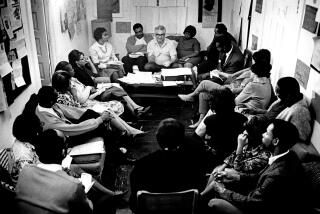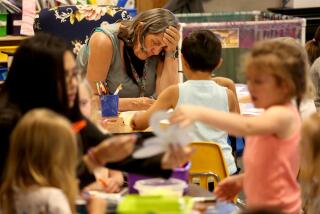Marilyn J. Whirry, 72; Local Educator Won National Teacher of the Year Award in 2000
- Share via
Marilyn Jachetti Whirry, who once considered teaching “boring” but became such an exemplary educator that she was named National Teacher of the Year, has died. She was 72.
Whirry died Friday at her home in Torrance of lung disease, said her assistant, Yvonne Whitcomb.
“Her teaching style, I understand, is like a softer, more nurturing version of professor Kingsfield in ‘The Paper Chase,’ ” President Clinton said, alluding to a popular movie and television series from the 1970s. His comments were made at a Rose Garden ceremony when he presented Whirry with the Crystal Apple award as National Teacher of the Year in 2000.
“She paces the room, posing questions to each student, responding to each answer with still more questions, digging deeper and deeper into the toughest texts until their meanings are revealed.”
The honor took Whirry out of the classroom and on the speaking circuit. She traveled 25 days a month, appearing before small groups and addressing 12,000 people at a conference in Kyoto, Japan.
Her speeches often focused on better recruitment and retention of well-educated teachers and ways to instill in students the passion for new ideas and challenges.
Most recently, Whitcomb said, Whirry had been editing a newsletter for a group called the National Assessment of Education Progress.
Whirry never intended to become a teacher.
“I saw teachers as boring people,” she told The Times in 2000 when she won the national recognition. “I had no desire to be like them.”
Upset that her graduate scholarship required that she teach a class, she was amazed to realize that, when she was forced to try it, she loved teaching.
“It was my epiphany,” she wrote in the national teacher application.
The award is co-sponsored by the Council of Chief State School Officers and the publishing company Scholastic Inc.
Whirry taught English from 1967 until 2000 at Mira Costa High School in the Manhattan Beach School District. She also headed the school’s English department, overseeing 90 sections of English and mentoring teachers.
She estimated that she had taught English to more than 4,000 students and given more than 350 workshops for teachers across the country on reading, writing, standards and assessment and what she called “collaborative learning.”
Known for her enthusiasm and motherly prodding, Whirry insisted that her students participate in discussions, critiquing one another and even her, as part of that collaborative process.
That’s “where real learning comes from, the ability to ask sincere and sensible questions, the ability to analyze and synthesize and get ideas together so that one can begin thinking for oneself,” she told CNN in 2000.
She never gave her own students time or opportunity for boredom.
“We don’t want kids to be bored. We want them to be thrilled with what they learn,” she told PBS’ “NewsHour With Jim Lehrer” at the time of her award. “I run primarily a Socratic seminar-type class but a lot of small-group discussions. I very early on got rid of my desk because they prevent good thinking; they prevent good discussion in a classroom.... I got some tables and some beanbag chairs and put kids in clumps of people talking about ideas, analyzing, synthesizing, developing ideas.
“I question them and they question me and they question each other,” she said. “And I hope in this environment kids and students of all ages begin to love to learn.”
Each term, her Advanced Placement English class was required to read two dozen books and plays, write more than 30 essays and critique and write poetry.
“I don’t have any discipline problems in any of my classes because they are so busy,” she told The Times in 1988.
She was candid with her students, dubbed “Whirry-ites,” even about her treatment for breast cancer, which caused her hair to fall out. The students responded by helping her carry books and shop for groceries.
“It taught them a lesson in life and how we struggle for life, to give it meaning at all moments,” she said.
After 1990, in addition to teaching English at Mira Costa High, Whirry taught education classes at Loyola Marymount University.
She served on the National Assessment Governing Board, which sets policy for national tests in reading, math and other subjects.
She also helped design California’s high school exit examination, mandated by the state Legislature.
In 1988, Whirry was one of 12 recipients of the $25,000 California Educator Award. She was also selected by the Southland affiliate of the California Assn. of Teachers of English as the outstanding English teacher of 1987.
Growing up in Trenton, N.J., Whirry suffered several physical problems as a child. A sailboat accident put her temporarily into a semi-coma.
She later developed pneumonia, which weakened her lungs. Suffering asthma, she came to Southern California at 18 in search of a better climate.
She attended a small private women’s school, Immaculate Heart College in Los Angeles, which encouraged independent thinking and closed shortly after she earned her bachelor’s and master’s degrees in English.
Years later, she earned a doctorate in contemporary literature from International College in Los Angeles.
After teaching initially in Massachusetts schools, she earned her California teaching credential and joined the faculty at Mira Costa.
Whirry is survived by two sons, Robert of Los Angeles and David of Bakersfield, and four grandchildren.
Funeral services will be private. Whitcomb said anyone interested in a pending memorial service should contact marilynwhirrytribute@yahoo.com.
More to Read
Sign up for Essential California
The most important California stories and recommendations in your inbox every morning.
You may occasionally receive promotional content from the Los Angeles Times.













